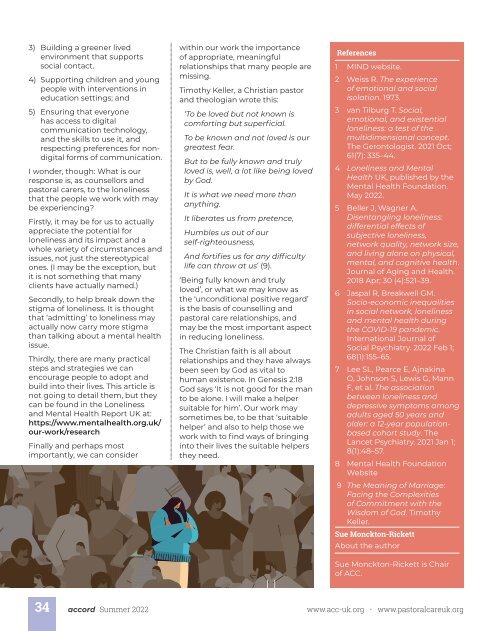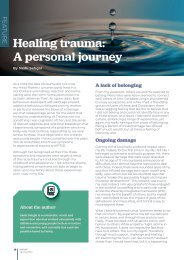ACC E-Accord Summer 2022
Create successful ePaper yourself
Turn your PDF publications into a flip-book with our unique Google optimized e-Paper software.
3) Building a greener lived<br />
environment that supports<br />
social contact.<br />
4) Supporting children and young<br />
people with interventions in<br />
education settings; and<br />
5) Ensuring that everyone<br />
has access to digital<br />
communication technology,<br />
and the skills to use it, and<br />
respecting preferences for nondigital<br />
forms of communication.<br />
I wonder, though: What is our<br />
response is, as counsellors and<br />
pastoral carers, to the loneliness<br />
that the people we work with may<br />
be experiencing?<br />
Firstly, it may be for us to actually<br />
appreciate the potential for<br />
loneliness and its impact and a<br />
whole variety of circumstances and<br />
issues, not just the stereotypical<br />
ones. (I may be the exception, but<br />
it is not something that many<br />
clients have actually named.)<br />
Secondly, to help break down the<br />
stigma of loneliness. It is thought<br />
that ‘admitting’ to loneliness may<br />
actually now carry more stigma<br />
than talking about a mental health<br />
issue.<br />
Thirdly, there are many practical<br />
steps and strategies we can<br />
encourage people to adopt and<br />
build into their lives. This article is<br />
not going to detail them, but they<br />
can be found in the Loneliness<br />
and Mental Health Report UK at:<br />
https://www.mentalhealth.org.uk/<br />
our-work/research<br />
Finally and perhaps most<br />
importantly, we can consider<br />
within our work the importance<br />
of appropriate, meaningful<br />
relationships that many people are<br />
missing.<br />
Timothy Keller, a Christian pastor<br />
and theologian wrote this:<br />
‘To be loved but not known is<br />
comforting but superficial.<br />
To be known and not loved is our<br />
greatest fear.<br />
But to be fully known and truly<br />
loved is, well, a lot like being loved<br />
by God.<br />
It is what we need more than<br />
anything.<br />
It liberates us from pretence,<br />
Humbles us out of our<br />
self-righteousness,<br />
And fortifies us for any difficulty<br />
life can throw at us’ (9).<br />
‘Being fully known and truly<br />
loved’, or what we may know as<br />
the ‘unconditional positive regard’<br />
is the basis of counselling and<br />
pastoral care relationships, and<br />
may be the most important aspect<br />
in reducing loneliness.<br />
The Christian faith is all about<br />
relationships and they have always<br />
been seen by God as vital to<br />
human existence. In Genesis 2:18<br />
God says ‘It is not good for the man<br />
to be alone. I will make a helper<br />
suitable for him’. Our work may<br />
sometimes be, to be that ‘suitable<br />
helper’ and also to help those we<br />
work with to find ways of bringing<br />
into their lives the suitable helpers<br />
they need.<br />
References<br />
1 MIND website.<br />
2 Weiss R. The experience<br />
of emotional and social<br />
isolation. 1973.<br />
3 van Tilburg T. Social,<br />
emotional, and existential<br />
loneliness: a test of the<br />
multidimensional concept.<br />
The Gerontologist. 2021 Oct;<br />
61(7): 335–44.<br />
4 Loneliness and Mental<br />
Health UK, published by the<br />
Mental Health Foundation.<br />
May <strong>2022</strong>.<br />
5 Beller J, Wagner A.<br />
Disentangling loneliness:<br />
differential effects of<br />
subjective loneliness,<br />
network quality, network size,<br />
and living alone on physical,<br />
mental, and cognitive health.<br />
Journal of Aging and Health.<br />
2018 Apr; 30 (4):521–39.<br />
6 Jaspal R, Breakwell GM.<br />
Socio-economic inequalities<br />
in social network, loneliness<br />
and mental health during<br />
the COVID-19 pandemic.<br />
International Journal of<br />
Social Psychiatry. <strong>2022</strong> Feb 1;<br />
68(1):155–65.<br />
7 Lee SL, Pearce E, Ajnakina<br />
O, Johnson S, Lewis G, Mann<br />
F, et al. The association<br />
between loneliness and<br />
depressive symptoms among<br />
adults aged 50 years and<br />
older: a 12-year populationbased<br />
cohort study. The<br />
Lancet Psychiatry. 2021 Jan 1;<br />
8(1):48–57.<br />
8 Mental Health Foundation<br />
Website<br />
9 The Meaning of Marriage:<br />
Facing the Complexities<br />
of Commitment with the<br />
Wisdom of God. Timothy<br />
Keller.<br />
Sue Monckton-Rickett<br />
About the author<br />
Sue Monckton-Rickett is Chair<br />
of <strong>ACC</strong>.<br />
34 accord <strong>Summer</strong> <strong>2022</strong> www.acc-uk.org • www.pastoralcareuk.org



